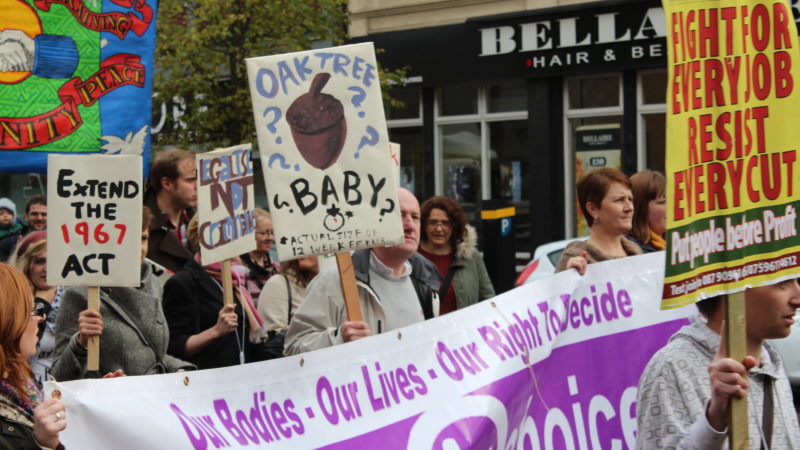Last Thursday, Stella Creasy won a victory for Northern Irish women. But there's a way to go before they get equality.

Last Thursday, Stella Creasy proposed an amendment to the Queen’s Speech, requesting NHS-funded abortions be extended to Northern Irish women.
And she won. In order to subdue any Tory rebellion in parliament, the government was forced to announce that Northern Irish women will now qualify for NHS-funded abortions in England and Wales.
I grew up in social housing and had an abortion at eighteen. Experience tells me we should celebrate the provision of NHS abortions to Northern Irish women with caution: healthcare equality is not as simple as everybody paying the same.
Northern Ireland has some of the strictest abortion laws in Europe meaning Northern Irish women seeking terminations often travel to Britain. Without NHS coverage, the termination procedure alone can cost up to £1400. Extending NHS coverage to Northern Irish women may ease healthcare inequalities at the point of use but it does little to erase class barriers to healthcare provision more widely.
Sex, gender and class equality are major issues within healthcare. In 2016, researchers at the University of York devised healthcare equity indicators in a bid to address the social gradient rampant within health services.
Healthcare is often a postcode lottery: affluent areas tend to correlate with higher performing hospitals and vice versa. This healthcare lottery is compounded by sex and gender in Northern Ireland, with inequity in reproductive rights relative to the rest of the UK normalised through the devolved health authority of Stormont.
But while eliminating abortion procedure costs might ease the financial burden for Northern Irish women, terminations incur greater costs than just those at the point of use. Accommodation, childcare, time off work and travel still require capital, and pose considerable obstacles to working class women.
In underage pregnancy costs can escalate further: school-age girls often rely on guardians to fund travel and accompany them to Britain. Underage pregnancy is also higher among working-class girls, meaning those most in need of abortion are disproportionately prevented from accessing one.
And the inequity in abortion access manifests not only at the intersection of age and class but in abusive relationships. In 2014, Diana Greene Foster led the ‘Turnaway Study’ which found a lack of abortion access binds women to abusive partners. Women in abusive relationships are subject to multiple layers of violence against dignity and self.
Turnaway reports that women denied access to abortion are also more likely to experience poverty and anxiety. Socioeconomic inequity reproduces health inequity and vice versa, exaggerating the emotional trauma of unwanted pregnancy, abortion and restrictive abortion laws.
Abortions entail considerable emotional strain, more so if far from the support networks. In Britain, free post-abortion counselling is offered to all women including Northern Irish women but geography can render counselling inaccessible. In Northern Ireland, abortion counselling is basically non-existent outside Belfast. For Northern Irish women, the cost of abortion exceeds termination procedure costs; contingent on capital not required of English, Scottish and Welsh women.
Abolishing termination fees for Northern Irish women rightly brings healthcare inequity to the fore. But decisions about women’s bodies are still put to vote in gilded parliaments where men outnumber women 2:1. And unless we refuse to settle for anything less than parity of esteem for our Northern Irish sisters, healthcare inequity will continue to thrive along fault lines of age, sex and class.
Kate Flood is an anthropology postgraduate at Sussex, researching aesthetics, class and resistance. She is on Twitter here.
Sign up to Left Foot Forward’s weekday email here.
Left Foot Forward doesn't have the backing of big business or billionaires. We rely on the kind and generous support of ordinary people like you.
You can support hard-hitting journalism that holds the right to account, provides a forum for debate among progressives, and covers the stories the rest of the media ignore. Donate today.



